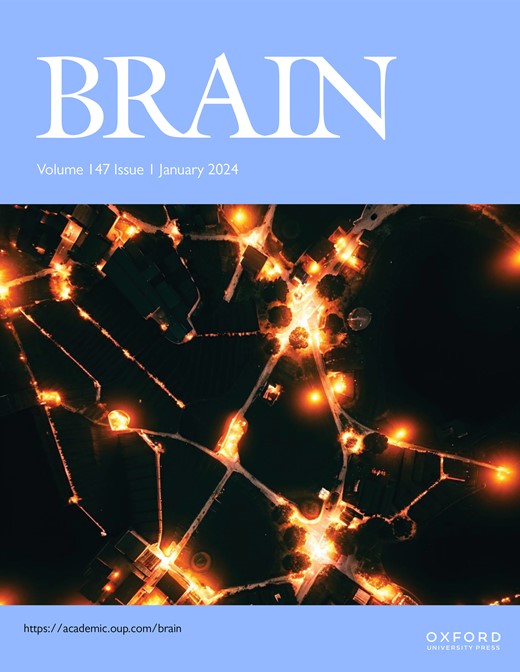CCL2 blockade combined with PD-1/P-selectin immunomodulators impedes breast cancer brain metastasis
IF 10.6
1区 医学
Q1 CLINICAL NEUROLOGY
引用次数: 0
Abstract
Over the last two decades, the diagnosis and treatment of breast cancer patients have considerably improved. However, brain metastases remain a major clinical challenge and a leading cause of mortality. Thus, a better understanding of the pathways involved in the metastatic cascade is essential. To this end, we have investigated the reciprocal effects of astrocytes and breast cancer cells, employing traditional 2-dimensional cell culture and our unique 3-dimensional multicellular tumoroid models. Our findings revealed that astrocytes enhance the proliferation, migration, and invasion of breast cancer cells, suggesting a supportive role for astrocytes in breast cancer outgrowth to the brain. Elucidating the key players in astrocyte-breast cancer cells crosstalk, we found that CCL2 is highly expressed in breast cancer brain metastases tissue sections from both patients and mice. Our in vitro and in vivo models further confirmed that CCL2 has a functional role in brain metastasis. Given their aggressive nature, we sought additional immune checkpoints for rationale combination therapy. Among the promising candidates were the adhesion molecule P-selectin, which we have recently shown to play a key role in the crosstalk with microglia cells, and the co-inhibitory receptor PD-1, the main target of currently approved immunotherapies. Finally, combining CCL2 inhibition with immunomodulators targeting either PD-1/PD-L1 or P-selectin/P-Selectin Ligand-1 axes in our human 3-dimensional tumoroid models and in vivo presented more favorable outcomes than each monotherapy. Taken together, we propose that CCL2-CCR2/CCR4 is a key pathway promoting breast cancer brain metastases and a promising target for an immunotherapeutic combination approach.CCL2阻断与PD-1/P-选择素免疫调节剂相结合可阻止乳腺癌脑转移
在过去的二十年里,乳腺癌患者的诊断和治疗水平有了很大提高。然而,脑转移仍然是一项重大的临床挑战,也是导致死亡的主要原因之一。因此,更好地了解转移级联所涉及的途径至关重要。为此,我们采用传统的二维细胞培养和独特的三维多细胞肿瘤模型,研究了星形胶质细胞和乳腺癌细胞的相互影响。我们的研究结果表明,星形胶质细胞能增强乳腺癌细胞的增殖、迁移和侵袭,这表明星形胶质细胞在乳腺癌向脑部生长的过程中起到了支持作用。在阐明星形胶质细胞与乳腺癌细胞之间相互影响的关键因素时,我们发现 CCL2 在患者和小鼠的乳腺癌脑转移组织切片中均有高表达。我们的体外和体内模型进一步证实了 CCL2 在脑转移中的功能性作用。鉴于乳腺癌的侵袭性,我们为合理的联合疗法寻找了更多的免疫检查点。其中有希望的候选者包括粘附分子 P-选择素(我们最近证明它在与小胶质细胞的串扰中发挥了关键作用)和协同抑制受体 PD-1(目前批准的免疫疗法的主要靶点)。最后,在我们的人体三维类肿瘤模型和体内,将 CCL2 抑制与针对 PD-1/PD-L1 或 P-选择素/P-选择素配体-1 轴的免疫调节剂结合使用,会比每种单一疗法带来更有利的结果。综上所述,我们认为CCL2-CCR2/CCR4是促进乳腺癌脑转移的关键通路,也是免疫治疗联合方法的理想靶点。
本文章由计算机程序翻译,如有差异,请以英文原文为准。
求助全文
约1分钟内获得全文
求助全文
来源期刊

Brain
医学-临床神经学
CiteScore
20.30
自引率
4.10%
发文量
458
审稿时长
3-6 weeks
期刊介绍:
Brain, a journal focused on clinical neurology and translational neuroscience, has been publishing landmark papers since 1878. The journal aims to expand its scope by including studies that shed light on disease mechanisms and conducting innovative clinical trials for brain disorders. With a wide range of topics covered, the Editorial Board represents the international readership and diverse coverage of the journal. Accepted articles are promptly posted online, typically within a few weeks of acceptance. As of 2022, Brain holds an impressive impact factor of 14.5, according to the Journal Citation Reports.
 求助内容:
求助内容: 应助结果提醒方式:
应助结果提醒方式:


